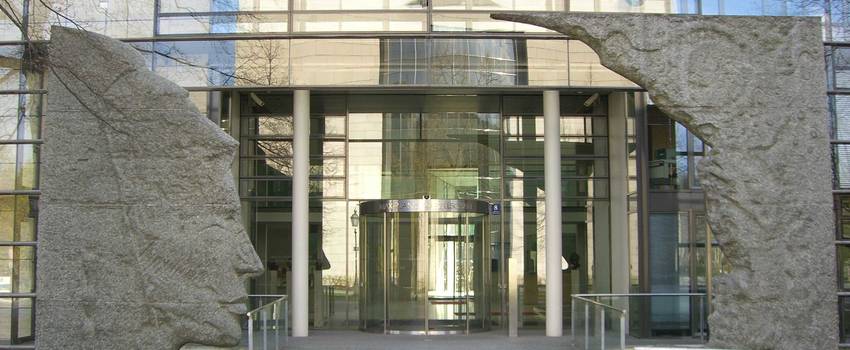Rüdiger Klein How Does the Presence of FLRT Proteins Influence Cortex Folding?
Rüdiger Klein is Director and Scientific Member at the Max Planck Institute of Neurobiology and Head of the Department ‘Molecules – Signals – Development’. He is also Honorary Professor of Biology at the Ludwig Maximilian University of Munich. Furthermore, he is member of the editorial boards of the EMBO Journal and of Neural Development and member of the scientific advisory boards of the Center for the Biology of Disease, Leuven, and of the Center for Nanoscale Microscopy and Molecular Physiology of the Brain, Göttingen. In addition, he is an elected member of the European Molecular Biology Organization (EMBO) and recipient of the Remedios Caro Almela Prize for Research in Developmental Neurobiology (2008).
Area of Research
Molecular Neurobiology
since 2001
Director and Scientific Member
Max Planck Society (more details)
Max Planck Institute of Neurobiology
since 2002
Member
Ludwig Maximilian University Munich (Ludwig-Maximilians-Universität München)
Faculty of Biology
1998-2002
Member
Heidelberg University (Ruprecht-Karls-Universität Heidelberg)
Faculty of Biology
1993-2001
Group Leader
European Molecular Biology Laboratory
1991-1993
Staff Scientist
Bristol-Myers Squibb Pharmaceutical Research Institute
1988-1990
Postdoctoral Fellow
Frederick Cancer Research and Development Center
National Cancer Institute
1987
PhD
University of Tübingen (Eberhard Karls Universität Tübingen)
Faculty of Biology
1985
Diploma
University of Tübingen (Eberhard Karls Universität Tübingen)
1980
Bachelor of Science
Juniata College
Prizes
- Methusalem Lecture at VIB-KU Leuven, Belgium (2014)
- Remedios Caro Almela Prize for Research in Developmental Neurobiology (2008)
- Honorary Professor, Faculty of Biology, Ludwig-Maximilian-University of München (since 2006)
- Hansen Family Award of the Bayer Foundation (2005)
- Elected Member of the European Molecular Biology Organization (EMBO) (1998)
Fellowships
- Postdoctoral Fellowship From the Boehringer Ingelheim Fonds (1988-1990)
- Fulbright Fellowship for Undergraduate Studies in the USA (1980)
- ERC Synergy Grant (2013-2019)
 © Maximilian Dörrbecker
© Maximilian Dörrbecker
Max Planck Society
"The Max Planck Society is Germany's most successful research organization. Since its establishment in 1948, no fewer than 18 Nobel laureates have emerged from the ranks of its scientists, putting it on a par with the best and most prestigious research institutions worldwide. The more than 15,000 publications each year in internationally renowned scientific journals are proof of the outstanding research work conducted at Max Planck Institutes – and many of those articles are among the most-cited publications in the relevant field." (Source)
Institute
Max Planck Institute of Neurobiology
The Max Planck Institute of Neurobiology (MPIN) is situated in Martinsried, at the Southwest border of Munich. The institute is devoted to basic research and investigates the basic function, structure, development and plasticity of the central nervous system.
The area of research covered by scientists at the institute can be illustrated by way of the following example: While you read this text, your brain monitors and controls the function of your organs, calculates and coordinates even the minutest movement, particularly of the eyes, and analyses the incoming information from your various senses. But how does the brain manage to process all this information at once? How are its nerve cells connected in order to enable this? How does such a complex system develop and how does it learn? What happens on the molecular level right up to the synapses, the cells and the circuits?
These are only some of the questions occupying the scientists at our institute. Since their research takes them to the very boundaries of human knowledge, such questions are studied not on human beings, but by employing computer simulations, cell cultures and animal models instead. (Source)
Map
RÜDIGER KLEIN and his research group are interested in the question of how newly born cells, so-called neurons, communicate with other cells during embryonic development and how this communication shapes the brain. During development, neurons explore their environment for the presence of chemical signals. One family of such chemical signals are called FLRTs. It is assumed that these FLRT proteins tell the neurons in which way to migrate from the inner to the outer layer of the cortex and, thereby, control cortex folding. As Rüdiger Klein explains in this video, the researchers manipulated genes of mice to find out how exactly this mechanism works. Their results suggest that there is an inverse correlation between the levels of FLRT and the degree of cortex folding: the less FLRT, the more folding we see. Their findings offer new insights into the mechanisms of the folding of the human brain.
LT Video Publication DOI: https://doi.org/10.21036/LTPUB10459
Regulation of Cerebral Cortex Folding by Controlling Neuronal Migration via FLRT Adhesion Molecules
- Daniel del Toro, Tobias Ruff, Erik Cederfjäll, Ana Villalba, Gönül Seyit-Bremer, Víctor Borrell and Rüdiger Klein
- Cell
- Published in 2017









